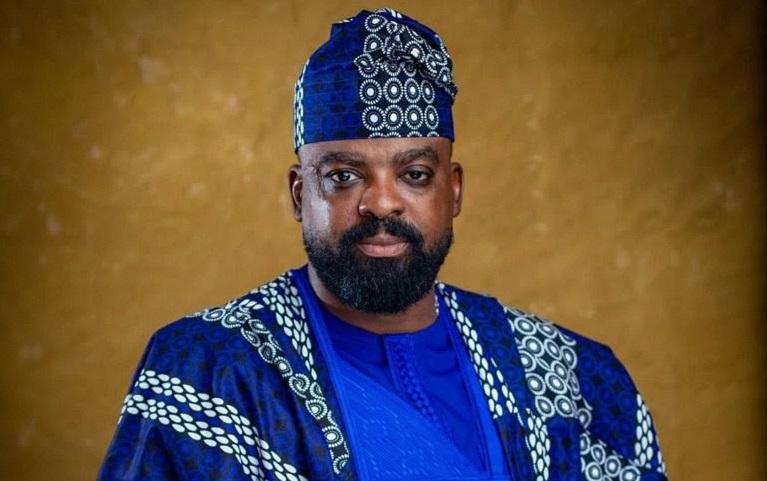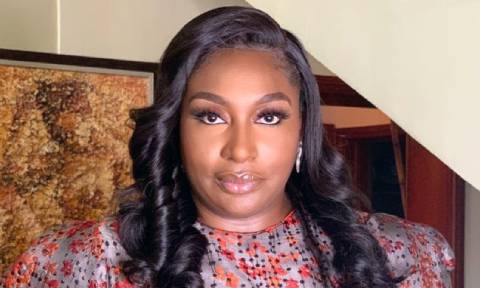
The name Teco Benson is synonymous with Nollywood. Having produced and directed movies for the past eleven years, Benson is still striving for advancement in his career. Already, his office is like a gallery of awards he won in his career.
He spoke to us on his achievements, challenges, vision among others in this interview.
But this moviemaker has a big problem on his mind about the industry he is a major player in. He fears that the way pirates gnaw at the soul of the movie industry, very soon there would be an RIP mark on the industry unless the government and other agencies act on time to redeem the situation.
He has been there for years and has seen and known what the ailment in the sector is about, therefore he is in a position to raise genuine alarm on what goes on in Nollywood.
I am a filmmaker, a producer and director. I used to act but that was about eleven years ago. I came into the industry 15 years ago, in 1994 with a vision to impact good change in the society. Then, it was not easy but I had to remain because of the love I have for filmmaking. I was born to be here. Because I was a civil servant when I came into the industry, my livelihood was sustained. I wanted to use it as a vehicle to project my message of change. Many of those who joined the industry the same time I did have opted out, being frustrated out of it because they were here for the money and of course, then there was very little or no money in film making. There used to be the wrong notion that Nollywood is only good at juju films but I decided to take it to another level and show that we are capable of producing better things. Prior to my entry into the film industry, as a civil servant, I wasn’t fulfilled. I think I am very happy in what I do now. I am so glad that God directed me properly.
In 1996 I started producing and because I used a lot of big names to make incredible movies like Suicide Mission, End of the Wicked, The Price and State of Emergency, my name soon became a household name. I think when I became a director I also was able to control the content of the films. I must say that since I started making films, I have never made any that failed.
I always try to be original. I am not influenced by foreign movies or books, but I have always loved action movies as a growing child.
What encourages an investor is good returns and those days it came very fast because we had piracy at a very minimal level. People respected intellectual property. Then, it was only foreign movies that were rented by Video Net and some others but soon others started to try it out on local movies and nothing was done about it. Movies are not meant for renting. They are made for home use. Now we have pirates who duplicate movies, sell them and put the money in their pockets. The worst is a group of pirates who have organized themselves into a chain and they record and duplicate several films on a single DVD and that is the final blow to the Nigerian film industry.
Yet the government has not done anything about it. With this, the film quality is dropping due to insufficient funds. Another challenge is the lack of sophisticated equipment. In developed countries, there are various cameras and other devices that would make a movie to be of high quality and production but because those things are not entirely available to us here, ours still remain some how below the mark. When the Americans started filmmaking in 1895, they were not watching anybody. They pioneered it and grew to where they are today. But we are not supposed to take the same amount of years it took them to make Nollywood to be of high standard.
Also, people complain that Nigerian films are always very noisy. But these distorting sounds that affect the sound quality of our movies are from generators, the countries major and most reliable source of power and sounds from the environment. Because we do not have sufficient funds to have a film village, we use public places and people’s properties and these people have neighbours who at the time of the shooting might have their generators running. We cannot ask them to switch off or ask motorists not to sound their horns. But in more civilized countries, these inconveniences are not experienced. Another challenge I face is the lack of support from the government.
Apart from the funds we don’t get from the government, sometimes when a movie is made and we ask for some military gadgets, we pay outrageously even when these movies promote the not-so-good image of the police or army in the country. Yet after making things difficult for us, these same people criticize the poor production of the movies. Nollywood is one incredible means that God will use to clean up the battered image of this country.
When you see what Nigerians are subjected to at the airport, you will feel ashamed to be a Nigerian. Even though I have had some offers asking me to relocate to Hollywood and join in making movies there, I don’t aspire to leave Nollywood. People made Hollywood what it is today and by my faith and devotion, Nollywood will become a great industry to reckon with all over the world. That is my vision.
A lot of money is spent in promoting the movie – Mission to No Where both in Nigeria and abroad. Apart from the money for shooting the movie, about N15 million is needed to transfer the film to celluloid and this is done in the U.S. and after that, we have to make the film into cinematograph to be acceptable worldwide. In Nigeria alone, up to N15 million is used to promote movies by way of bill boards, in UK, the equivalent of almost N15 million was also used to advertise on bill boards on every street of London and posters are put in cinemas.
In Nigeria, people feel they cannot pay money to watch Nigeria films in cinemas but abroad that is where movies are launched first before it is sold for home use. I cannot put movies in cinemas because there are not enough cinemas, which is why we produce movies in video format and not celluloid. But if we had enough cinemas here, then the normal procedure can be followed that is why we are asking those who are capable of such investments to make cinemas and see what such profit can be made from films.
I am an international filmmaker and I have a global vision. When I make films I don’t make them for Nigerian consumption alone. I have a bigger picture in my mind. It has been difficult to penetrate the American cinema market, as I have done in London, Dublin and Scotland. Without an American star on the poster, the film will not sell. So I had plan to get American stars like Will Smith but having to pay $14 million, there was no way we can keep up with that. So we simply have to appreciate what we have and work with it.
I am happy but I am not fulfilled because a dead man is a fulfilled man. I am not happy with the industry because the numerous challenges have stopped us from attaining greater heights up till now. The industry that we have suffered and spent so much to build is crumbling due to the activities of pirates and because of the negligence of the government.
People need to be educated about the harm that piracy and promoting piracy is doing to the industry and the entire economy. Even though Nollywood gives employment to so many people, the government watches helplessly while the industry is threatened with death. In developed countries, the government puts money among other forms of support into the industry but here there is no such thing. Yet the government cannot simply protect the rights of the filmmakers.
At least, our efforts are well recognised and appreciated abroad, so much that some funds are given to filmmakers in Nigeria and other African countries by the French government. Hollywood contributed largely to America’s successes over time. Before America went to the moon, Hollywood first went there. The movies gave them the idea of flying to the moon. So many things had been initially designed in and for movies in America that gave birth to some things that we use today. It is an industry that God can use to move the nation forward so the government should do everything to protect and support it


















